The importance of addressing physical health in addiction recovery

Understanding the Integral Role of Physical Health in Addiction Recovery
Addressing physical health is a crucial component of effective addiction treatment. An integrated approach that encompasses physical wellness, mental health, and spirituality can significantly enhance recovery outcomes. This article explores the profound impact of physical health, the benefits of exercise and nutrition, and strategies to effectively incorporate these elements into a comprehensive recovery plan.
The Interconnection Between Physical Wellness and Holistic Recovery
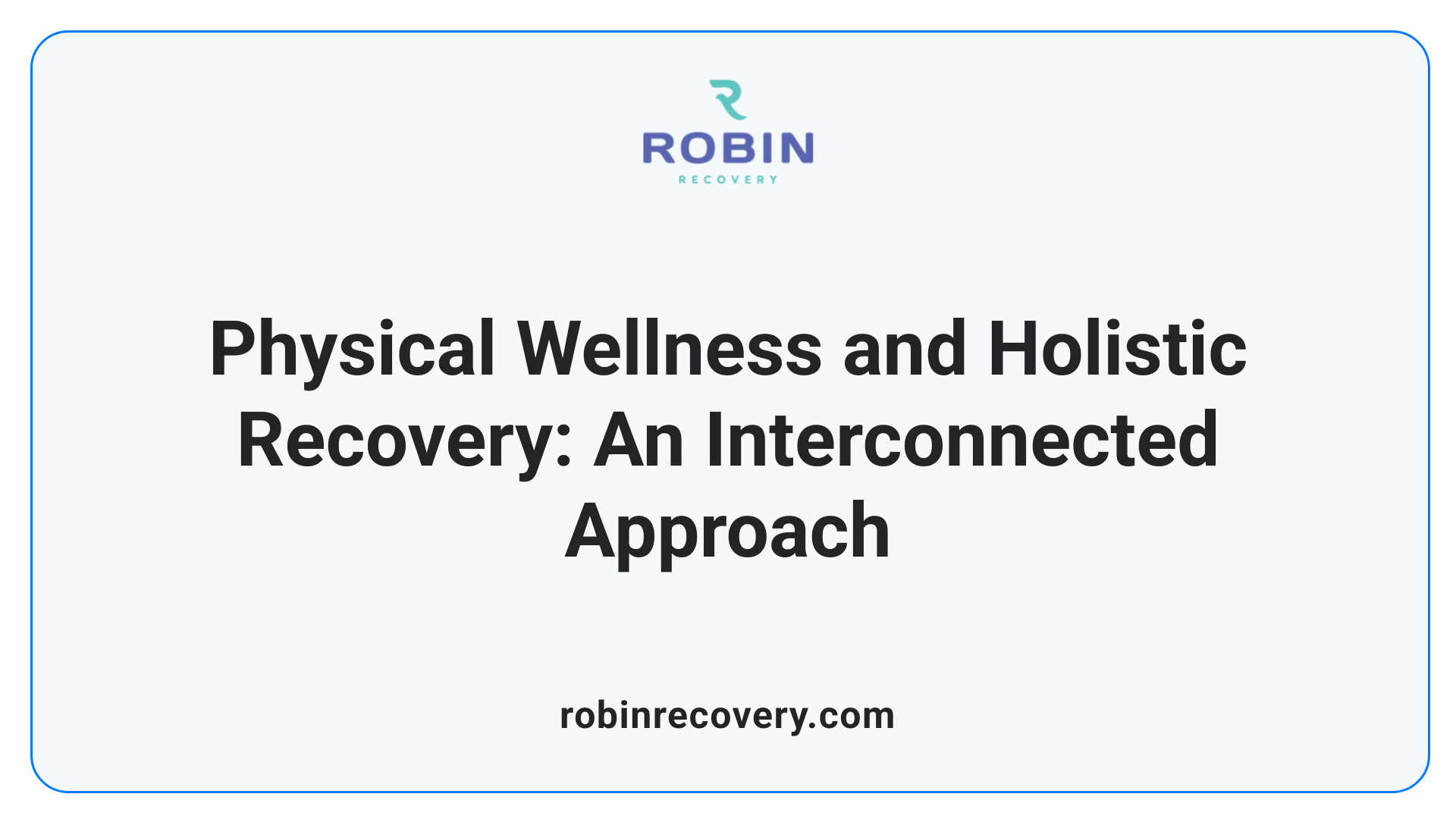
How does physical wellness integrate into a holistic approach to addiction recovery?
Physical wellness forms a vital part of a comprehensive recovery strategy. It involves activities like engaging in regular exercise, maintaining a nutritious diet, ensuring quality sleep, and practicing good hygiene. These activities help repair and strengthen organs affected by substance use, such as the heart, lungs, brain, and skin. Establishing daily routines that include these elements creates structure, reduces unhealthy habits, and promotes discipline. Enhancing physical health also boosts mental resilience by improving energy levels and mood through the release of endorphins. Activities like yoga and outdoor exercises further support emotional stability and stress management, integral for sustaining sobriety.
Incorporating physical wellness supports the entire recovery process by fostering a balanced body and mind. It encourages confidence, improves self-esteem, and contributes positively to social interactions, especially through group activities or outdoor adventures. These factors create a nurturing environment for long-term recovery, reinforcing the importance of a holistic approach that sees wellness as interconnected.
The eight core wellness dimensions recognized by SAMHSA
SAMHSA identifies eight dimensions of wellness that work together to support recovery. These include:
Dimension Description Examples of Activities Physical Overall health including diet, exercise, sleep, hygiene Regular check-ups, balanced diet, physical activity Emotional Recognizing and managing feelings Therapy, mindfulness, stress reduction techniques Spiritual Sense of purpose and connection Meditation, spiritual practices, community service Social Maintaining healthy relationships Support groups, social outings Intellectual Engagement in learning and mental growth Educational programs, hobbies, problem-solving Occupational Personal fulfillment through work or activities Job engagement, volunteer work Environmental Respect for surroundings and safety Creating safe spaces, outdoor activities Financial Managing resources wisely Budgeting, financial planning
These dimensions are interconnected. For example, physical activity can enhance emotional health, while social connections can boost spiritual well-being.
Why is maintaining physical health crucial for overall recovery success?
Healthy physical functioning directly impacts mental and emotional states, creating a foundation for sustained sobriety. Improved physical health enhances energy, reduces stress, and supports organ repair—a process especially important after heavy substance use or detox. Engaging in regular physical activity helps regulate sleep and reduces cravings, lowering relapse risks.
Additionally, nurturing physical well-being through proper nutrition and exercise boosts immunity, which can be compromised by substance abuse. This comprehensive care not only accelerates physical recovery but also improves confidence and self-esteem. As a result, individuals feel more empowered to face everyday challenges and maintain their sobriety in the long term.
By addressing the physical aspect holistically, recovery programs foster resilience, balance, and overall quality of life, making physical wellness an essential pillar within holistic addiction treatment.
Physical Wellness: A Foundation for Recovery
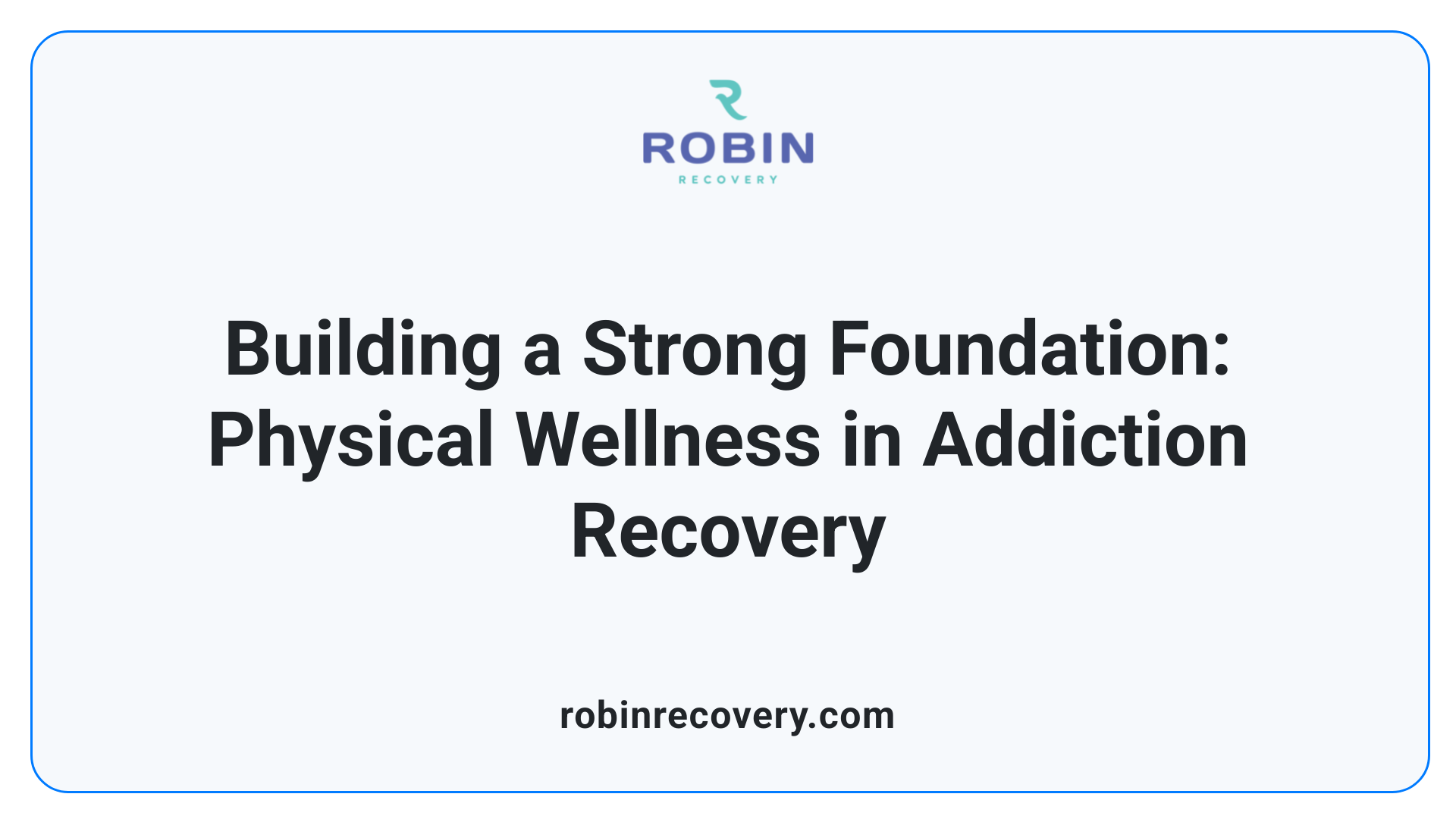
Why is physical wellness important in recovery?
Physical wellness is a critical aspect of overall health and plays a significant role in addiction recovery. Engaging in activities like regular exercise, maintaining a nutritious diet, and ensuring quality sleep can repair and rebuild physical health damaged by substance use. These activities help improve organ function—such as the lungs, heart, blood vessels, skin, and brain—restoring vital systems that often suffer during prolonged or heavy substance consumption.
Research and guidelines emphasize that physical health directly influences mental well-being, stress management, and resilience against relapse. For instance, physical activity increases endorphin production, boosting mood, reducing anxiety, and fostering a sense of discipline and stability.
How physical activity can reverse damage caused by substance use
Substance misuse can weaken the immune system, cause organ damage, and impair physical vitality. Incorporating consistent physical activity helps to reverse some of these effects by improving cardiovascular efficiency, strengthening muscles, and enhancing organ health. Activities such as aerobic exercises, strength training, yoga, and outdoor pursuits also promote social bonding and enjoyment, making recovery more engaging.
Exercise releases endorphins, hormones that help manage cravings and reduce stress, which are vital in the recovery process. Scientific studies demonstrate that establishing new, healthy habits of eating and exercise fosters confidence, discipline, and self-esteem, further supporting abstinence.
The importance of routines that promote sleep, hygiene, and physical health
Creating daily routines that focus on regular sleep, personal hygiene, and physical activity provides structure essential for recovery. These routines help develop self-control, prevent boredom—an often overlooked relapse trigger—and promote emotional resilience. For example, maintaining a consistent sleep schedule supports brain health and energy levels, while good hygiene can improve self-esteem and social interactions.
Structured routines also facilitate participation in support groups, work, hobbies, and spiritual practices, enhancing overall well-being. Addressing physical health early during treatment, through assessments, therapy, and lifestyle changes, can significantly accelerate recovery and reduce the risk of relapse.
Aspect Activity/Focus Benefit Physical activity Aerobic exercises, strength training, yoga, outdoor activities Improve cardiovascular health, reduce cravings, boost mood Sleep hygiene Regular sleep schedule, calming bedtime routines Enhance mental clarity, physical healing Personal hygiene Daily grooming, skin care Improve self-esteem, social comfort Establishing routines Consistent daily schedules Develop discipline, reduce boredom
Healthy routines that integrate physical and mental health practices form the backbone of sustainable recovery. By consistently prioritizing these habits, individuals strengthen their resilience, foster positive self-image, and support overall well-being.
In summary, physical wellness acts as a cornerstone in the recovery process, aiding in physical healing, emotional stability, and relapse prevention. A comprehensive approach that combines activity, nutrition, sleep, and routine helps to rebuild what addiction may have damaged—ultimately paving the way for a healthier, more balanced life.
Exercise, Nutrition, and Self-Care: Pillars of Sobriety Support
What role do exercise, nutrition, and self-care play in supporting sobriety?
Engaging in consistent physical activity, maintaining proper nutrition, and practicing good self-care are essential strategies in addiction recovery. Exercise helps produce endorphins, which are natural mood lifters, reduce cravings, and alleviate withdrawal symptoms. Regular physical activity not only boosts mental health but also promotes physical strength, helping individuals feel more capable and motivated during recovery.
Proper nutrition is equally important because substance use can weaken the immune system and cause nutrient deficiencies. Consuming a balanced diet rich in vitamins, minerals, and healthy fats supports brain healing, restores energy levels, and stabilizes blood sugar. Nutrients like omega-3 fatty acids play a critical role in repairing brain function and reducing inflammation caused by prolonged substance use.
Self-care practices, including adequate sleep and stress management, reinforce emotional stability. Good sleep hygiene promotes mental clarity and physical healing, while techniques like meditation or yoga help reduce anxiety and stress, which are common relapse triggers. Together, these practices build resilience, self-control, and confidence, creating a stable foundation for long-term sobriety.
How proper nutrition addresses deficiencies and supports brain healing
Prolonged drug use often leads to nutritional deficiencies that impair physical and mental health. An emphasis on nutrient-dense foods, such as lean proteins, fruits, vegetables, and healthy oils, replenishes essential vitamins and minerals. Specifically, omega-3 fatty acids found in fish and flaxseeds support brain tissue regeneration, improve mood, and enhance cognitive function.
Addressing nutritional gaps helps reduce symptoms like fatigue, depression, and anxiety, common in early recovery stages. It also stabilizes blood sugar levels, preventing mood swings and irritability. In addition, good nutrition boosts immune function, making body systems more resilient during the recovery process.
The role of self-care practices like sleep and stress management in strengthening recovery
Quality sleep is foundational for recovery as it allows the body to repair and restore neural pathways affected by substance use. Sleep management techniques, including establishing a regular bedtime and avoiding screens before sleep, improve sleep quality.
Stress management strategies like mindfulness meditation, deep breathing exercises, and engaging in hobbies help manage emotional triggers that can lead to relapse. These practices foster calmness and mental clarity, empowering individuals to handle challenges confidently.
By integrating these self-care habits into daily routines, individuals strengthen their overall well-being, reduce relapse risk, and develop healthier coping mechanisms. This comprehensive approach creates a robust pathway to lasting sobriety.
Physical Health and Recovery Outcomes
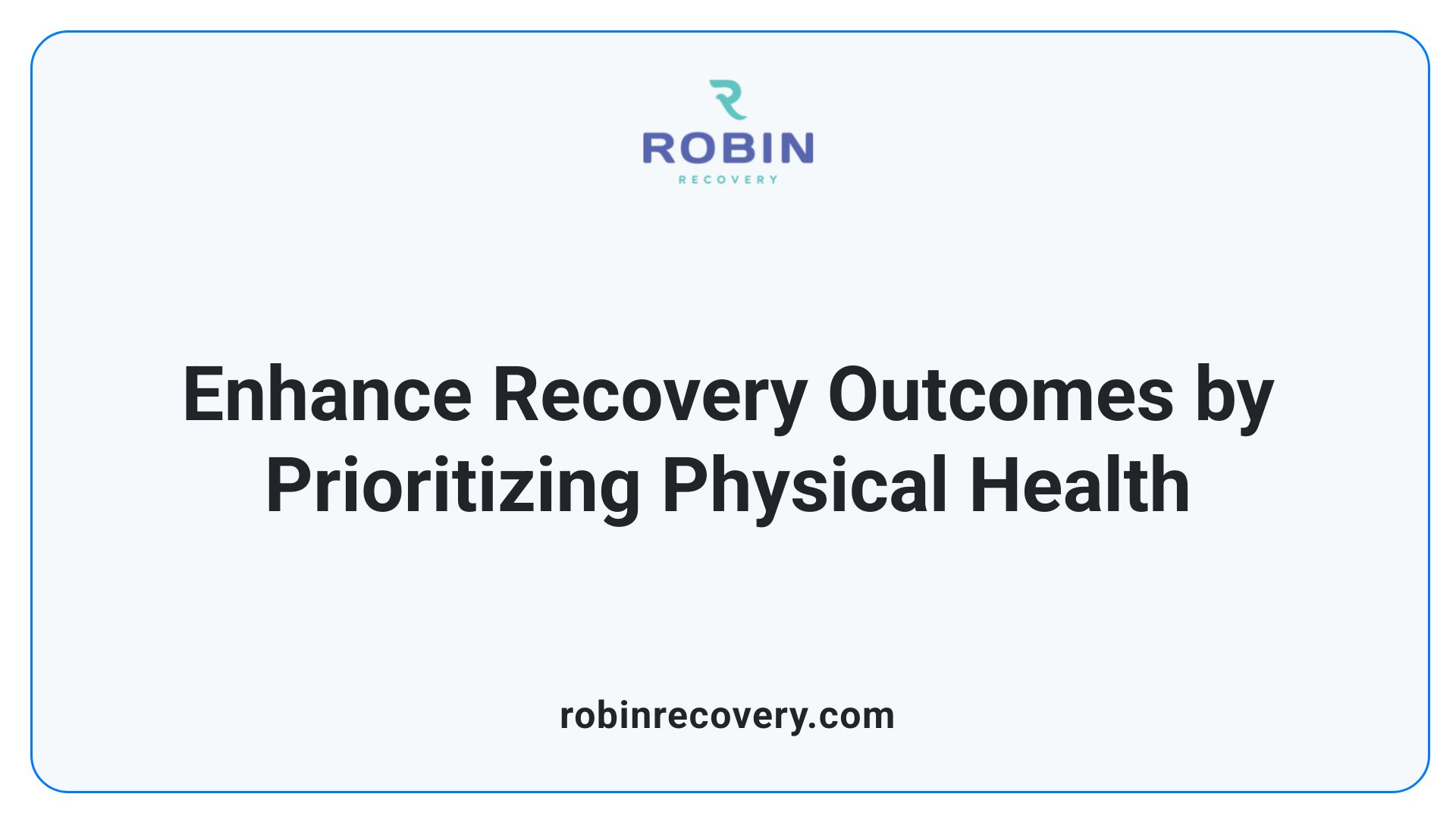
Physical wellness plays a vital role in the overall success of addiction recovery. When individuals focus on their physical health, they improve their chances of maintaining sobriety by boosting their resilience against relapse triggers.
Engaging in regular physical activity such as aerobic exercises, yoga, or strength training helps reduce cravings and eases withdrawal symptoms. Exercise releases endorphins and dopamine—hormones that elevate mood and foster feelings of reward, which can be especially beneficial in combating the neurological effects of substance misuse.
Improved physical health also supports mental well-being. Activities like walking, swimming, or group sports help decrease symptoms of depression and anxiety, common challenges during recovery. These activities foster self-efficacy and create routines, providing structure and purpose that discourage unhealthy habits.
Furthermore, physical activity enhances sleep quality and stress management, two critical elements in preventing relapse. Better sleep restores brain function, and stress reduction techniques like meditation or breathwork strengthen emotional stability.
Participating in enjoyable physical activities and social exercises also builds social connections and support networks—factors shown to increase motivation and accountability in ongoing recovery efforts. These elements collectively reinforce recovery capital, making sustained sobriety more achievable.
In summary, by integrating physical health practices into treatment plans, individuals can bolster their physical, emotional, and psychological defenses against relapse, supporting long-term recovery success.
Empowering Recovery Through Physical Activity
Types of physical activities beneficial during recovery
Engaging in diverse physical activities can greatly enhance the healing process during addiction recovery. Aerobic exercises like walking, swimming, cycling, and running are effective in boosting cardiovascular health, increasing energy levels, and releasing mood-enhancing endorphins. Strength training, including resistance exercises and weight lifting, helps restore muscle strength and physical vitality.
Mind–body practices such as yoga and Tai Chi promote relaxation, reduce stress, and improve mental focus. Outdoor activities like hiking, gardening, and group sports foster social connections while encouraging physical activity. Additionally, recreational activities like dance, group exercises, or adventure sports can make exercise enjoyable and more sustainable.
Each activity can be tailored to personal interests and physical ability, ensuring consistency and reducing dropout risk. Combining different types of physical activities creates a balanced routine that supports both mental and physical health during recovery.
Activity Type Benefits Suitable For Aerobic exercises Improve heart health, mood, energy Beginners, cardiovascular health focus Strength training Rebuild muscle, boost confidence Those looking to increase physical strength Yoga and Tai Chi Reduce stress, enhance flexibility Mental health improvement, relaxation Outdoor sports & hiking Social bonding, nature connection All fitness levels, social support Recreational dance & activities Fun, stress relief, coordination Those seeking joyful engagement
Integrating these activities into daily routines not only promotes physical health but also creates structure, fosters discipline, and builds resilience, all vital for sustaining long-term sobriety.
Strategies for Integrating Physical Wellness in Treatment
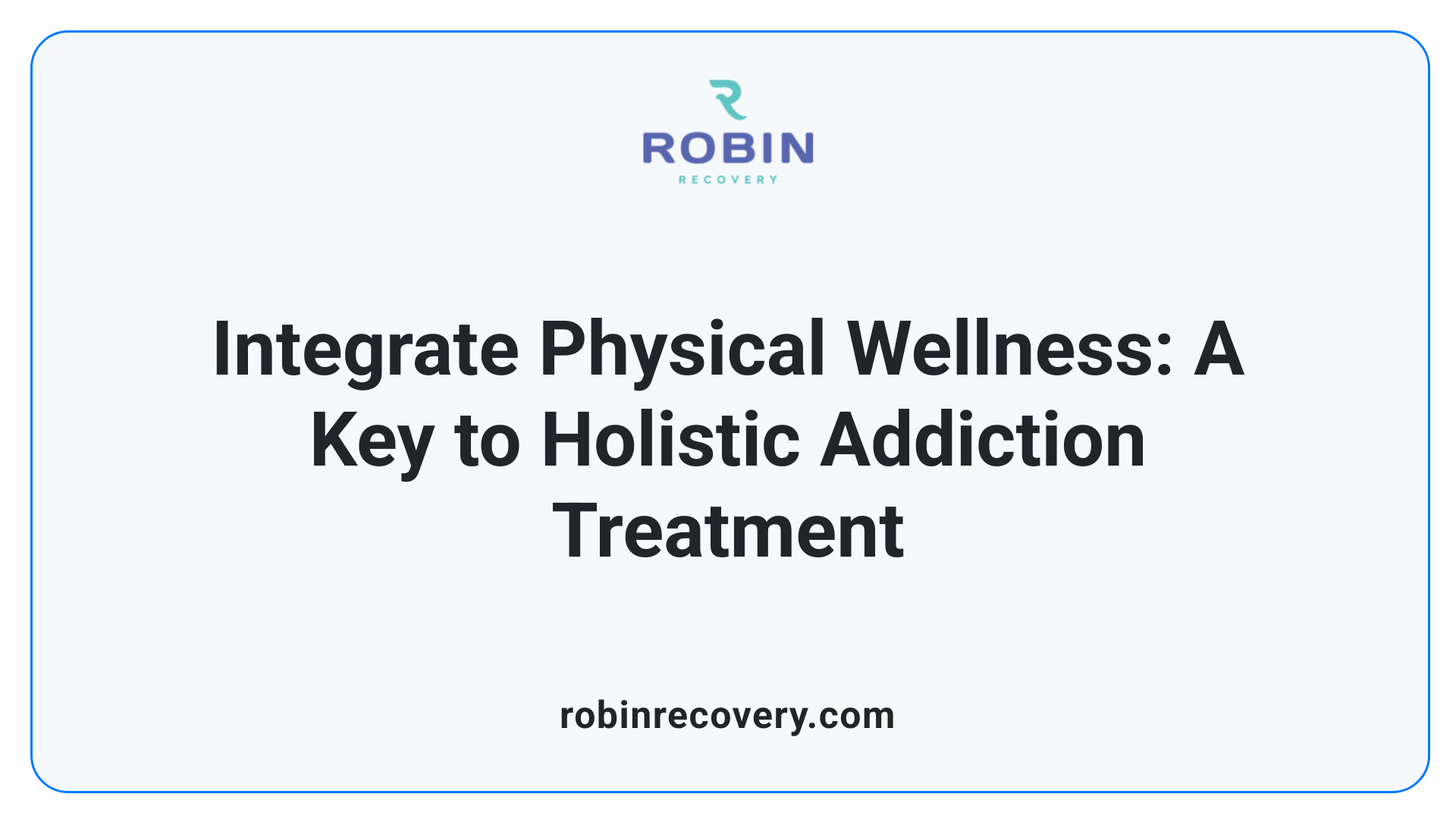
What strategies can be used to integrate physical wellness into addiction treatment?
Incorporating physical wellness into addiction recovery involves a multifaceted approach that targets both the body and mind. A key strategy is incorporating various exercise modalities, such as aerobic activities like walking, swimming, and cycling, strength training exercises, and mind-body practices like yoga and Tai Chi. These activities can be tailored to match individual recovery stages and interests, making them more sustainable and enjoyable.
Therapeutic interventions play a crucial role in complementing physical activities. For example, cognitive-behavioral therapy (CBT) can be combined with exercise programs to enhance motivation, set achievable goals, and develop coping strategies. These combined approaches address the psychological and physical dimensions of addiction, boosting overall treatment effectiveness.
Motivational strategies are vital to ensure continued participation. Techniques such as goal-setting, progress tracking, and fostering a supportive environment can strengthen commitment. Group activities or community-based programs provide social support, which not only boosts morale but also creates accountability.
To maximize neurobiological benefits, exercise programs should focus on activities that reduce cravings and improve mood. Enhanced production of endorphins and dopamine through regular activity can help manage withdrawal symptoms and decrease the likelihood of relapse.
Additionally, health education about healthy lifestyles, coupled with supportive policies and community engagement, can reinforce habits learned during treatment. Enjoyable, engaging activities, especially outdoor and social exercises, promote long-term commitment and contribute to a holistic sense of well-being.
By thoughtfully combining diverse physical activities, therapeutic support, and motivational methods, addiction treatment programs can significantly improve recovery outcomes and support sustained wellness.
The Need for Standardized Guidelines and Ongoing Support
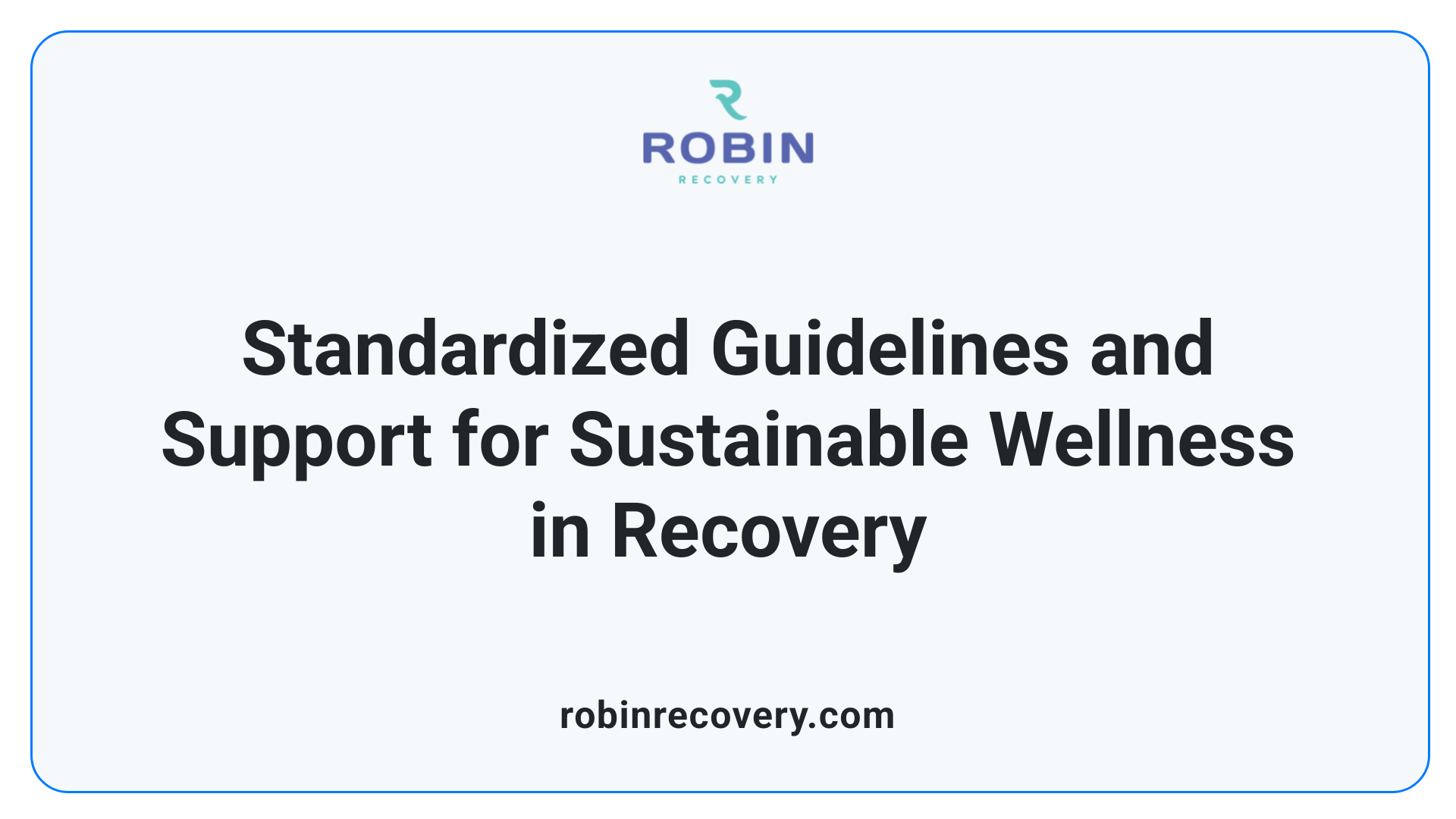
Despite the recognized importance of physical health in addiction recovery, there is significant variation in how treatment programs manage physical health conditions. Most clinical guidelines recommend establishing referral pathways for physical health concerns such as neurological issues and hepatitis, aiming to improve overall treatment outcomes. However, these guidelines often lack standardization, leading to inconsistencies across programs.
To ensure effective management, staff training is essential. Proper training equips health professionals with the skills to use assessment tools, monitor physical health closely, and address comorbidities like liver or heart issues. Incorporating regular evaluations helps tailor interventions and track progress.
Beyond initial treatment, continuous support programs play a vital role. Post-rehab initiatives, including ongoing counseling, group therapy, and lifestyle coaching, help individuals maintain healthy habits. These programs foster accountability and provide a support network, reducing relapse risks. Integrating physical health management both during and after treatment enhances long-term recovery and overall well-being.
Bringing It All Together for Effective Recovery
Addressing physical health in addiction recovery is not merely supportive; it is fundamental to achieving lasting sobriety. A holistic, integrated approach that emphasizes physical activity, proper nutrition, stress management, and ongoing support enhances treatment outcomes, reduces relapse risk, and promotes overall well-being. By recognizing the vital connection between the body, mind, and spirit, recovery programs can empower individuals to rebuild their lives stronger and healthier, ensuring a sustainable path to long-term sobriety and holistic well-being.
References
- Importance of Physical Wellness in Addiction Recovery - Alta Centers
- The Importance of Physical Health During Addiction Recovery
- Enhancing Substance Use Disorder Recovery through Integrated ...
- How Physical Health Impacts Addiction Recovery - First Steps
- Why Structure and Routine Are Important in Recovery
- Systematic review of guidelines for managing physical health during ...
- Physical health in recovery | UKAT - UK Addiction Treatment Centres
